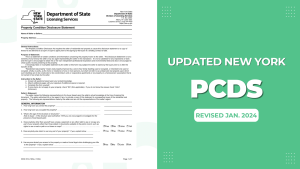We have previously posted concerning a significant amendment to the property condition disclosure law in New York. Previously, sellers of residential real estate were required to complete a detailed questionnaire concerning property conditions or issue a $500 credit at the closing for failure to deliver the document. Many sellers, especially those in  downstate NY, as serviced by our firm, preferred to issue the $500 credit instead of completing the form.
downstate NY, as serviced by our firm, preferred to issue the $500 credit instead of completing the form.
The new law, which becomes effective on March 20, eliminates the seller’s option to issue the $500 credit. Instead, it requires the completion and delivery of the form to the buyer before the contract is signed. Further, it contains more extensive information concerning flood risks and history and whether the property has been insured against flood risk. This author suggests that the amendment was motivated by devastating floods and water damage that have affected some home buyers in recent years, with the main goal being disclosure of flooding. The legislature went further than adding flooding disclosures and moved towards requiring full disclosure by the seller.
It remains to be seen how real estate professionals will handle the amended law. Although sellers are expected to complete the form, real estate agents may end up providing assistance. It may be preferable that sellers have the completed form ready at the same time that the accepted offer is provided to the seller’s attorney, who will prepare and deliver the proposed contract to the buyer’s attorney, so as not to delay the process of obtaining signed contracts as soon as possible. Otherwise, sellers may lean on their attorneys for advice in completing the form.
An aggressive stance may be the inclusion of a provision in a contract whereby the buyer waives the delivery of the form, but such a clause is contrary to the intent of the law and may not be effective. Further, the standard statement in a contract indicating that the property is sold “as is” and that the buyer is relying upon his own inspections and information, rather than seller representations, may need modification to acknowledge receipt of the completed form in light of the amended law. In fact, the new disclosure form states that it is not a warranty or substitute for the buyer’s own inspection. However, as a practical matter, when a buyer waives inspections in order to submit a more competitive offer to the seller, the buyer will be relying upon the information in the completed form. So long as the seller does not engage in active concealment of known adverse conditions, the seller should not be concerned about the amended law.
The existing exemptions to the property disclosure law will remain effective. For instance, an estate seller continues to be exempt from the delivery of the disclosure form. The logic behind this exemption is that the administrator or executor of the estate likely did not reside in the house and is not familiar with property conditions.
We will monitor the reaction of parties to real estate transactions as we enter this spring market and remain available to advise our clients accordingly.
 New York Real Estate Lawyers Blog
New York Real Estate Lawyers Blog


